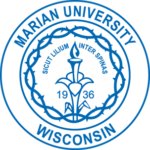Bachelor of Science in Nursing

Graduates are highly regarded by employers for their clinical competence and leadership abilities, and they’re prepared to face the ever-changing healthcare environment. Our BSN students start with nursing courses as a sophomore, and acceptance into Marian means acceptance into the BSN program.
The baccalaureate degree program in nursing, masters degree program in nursing at Marian University is accredited by the Commission on Collegiate Nursing Education (http://www.ccneaccreditation.org and the post graduate APRN certificate program will be evaluated for accreditation in Spring of 2024.
Learn more about our direct entry BSN program
“Marian’s nursing program really allowed me to get hands-on experience and the faculty did an amazing job of preparing me to enter the nursing profession. More than that, though, my time in the program was fun and I really appreciated how supportive and helpful everyone was from start to finish.”
Adrienne Fischer – 2019 Marian University graduate, Registered Nurse at St. Luke’s Medical Center in Milwaukee
A hallmark of the Bachelor of Science in Nursing program is the integration of our liberal arts core with our innovative curriculum and professional preparation. You will be given a broad educational foundation and develop an in-depth understanding of societal and healthcare issues with a focus on safe, effective, and evidence-based care. Our faculty will work with you to develop higher levels of critical thinking skills, see patterns across concepts, and use those patterns to deliver high quality and cost-effective care.
New Renovation
Marian University recently completed a renovation of a new, state-of-the-art Nursing space by C.D. Smith Construction. Marian’s Nursing program is located on the first and second floors of the Stayer Center and includes new, advanced simulation labs, observation rooms, skills labs for practicing more advanced nursing skills, health assessment training spaces, exam rooms, classrooms, as well as study areas for students and spaces for gathering and collaborating. “The new Nursing space is gorgeous,” said Michelle Majewski, President of Marian University. “If you want to be a nurse or nurse leader, Marian is the place to be.”
Bachelor of Science in Nursing Curriculum
Marian’s nursing program is designed to give students the foundation and knowledge they need to deliver safe, effective, and evidence-based care. Our students achieve success by directly interacting with experienced faculty, clinical agency staff, and fellow students in the classroom, the community, and in a variety of clinical experiences. Students practice throughout their educational journey in our on-campus nursing resource and simulation facility, the Center for Health Professions, and experience lab-enhanced learning guided by professional nurses.
General Education Courses
As a bachelor’s level student, you are required to take about 30 credits of general education courses as part of the 120 credits required for a bachelor’s degree. Gen eds are required regardless of your major.
All students take 10.5 to 17 credits in these areas:
- Mathematical Reasoning
- Argumentative and Research Writing
- Introduction to Christian Theology
- Interpersonal Communication
- Introduction to Ethical Reasoning
- First Year Studies
Core Courses
Nursing majors will take courses covering topics such as:
- Patient centered care across the lifespan
- Evidence based nursing
- Leadership and healthcare systems
- Anatomy and physiology
- Health assessment
Program Outcomes
- Patient-Centered Care: The graduate will partner with the patient whether individual, family, community, or population, and across the lifespan to provide compassionate and coordinated care with respect for preferences, values and needs.
- Informatics: The graduate will integrate information technology for the purposes of communication, workflow efficiency, knowledge management and clinical decision support creating a safe environment.
- Quality Improvement: The graduate participates in Quality Improvement to optimize achievement of patient outcomes with an emphasis on safety and organizational processes.
- Safety: The graduate integrates and analyzes aspects of safety to provide quality patient-centered, team, and organizational care to improve patient outcomes.
- Evidence-Based Practice: The graduate will use clinical judgment based on the exploration and integration of evidence from interprofessional perspectives to improve patient outcomes.
- Teamwork and Collaboration: The graduate will effectively collaborate and communicate with interprofessional team members, inclusive of the patient and system, while advocating for quality care across the lifespan.
- Clinical Judgment: The graduate utilizes clinical judgment to make evidence based decisions for safe and high quality individual, family, community, or population outcomes.
- Professionalism: The graduate incorporates leadership and system thinking skills by following the Code of Ethics in their professional practice.
The Bachelor of Science in Nursing program in the Nursing Department consists of the traditional pre-licensure BSN program and an RN to BSN completion program.
Bachelor of Science in Nursing Program Goals
The mission and philosophy of the Nursing Programs serve as a foundation for the development of program goals. The baccalaureate program goals are to provide a curriculum which:
- Combines the foundation of liberal arts and biopsychosocial sciences with baccalaureate level nursing concepts.
- Fosters professional growth, professional development, clinical judgment, and a commitment to life-long learning at the baccalaureate level.
- Fosters compassion and respect for people from diverse cultures and the belief that each person has the right to participate in the fullness of life to the greatest extent possible.
Professional Standards
The program uses the following professional standards and guidelines in the development, delivery, and assessment of the program:
Standards for Accreditation of Baccalaureate and Graduate Nursing Programs [Commission on Collegiate Nursing Education (CCNE), 2018] The Essentials of Baccalaureate Education for Professional Nursing Practice [American Association of Colleges of Nursing (AACN), 2008]
Mission Statement
The Nursing Department is an integral, dynamic, and innovative entity committed to the education and preparation of diverse healthcare professionals in a faith-based academic institution while improving the health and well-being of individuals, families and communities through the application of evidence-based practice in a global environment.
Program Philosophy
Provide state of the art undergraduate and graduate nursing education that endows nursing graduates with the knowledge, values, and skills to work within collaborative interdisciplinary teams to provide safe patient-centered care in any setting. Through the use of research evidence, health informatics, and knowledge of quality improvement, graduates will have the skill set to lead change in individual patient care settings, the community, and the nursing profession.
The undergraduate and graduate programs will provide a curriculum which fosters personal growth, professional development, commitment of service to the profession, lifelong learning, a community of respect, a commitment to social justice, and the freedom to explore spiritual traditions.
The nursing program is designed to deliver the best possible preparation for the National Council Licensure Examination-Registered Nurse (NCLEX-RN®). Graduates are educationally and experientially prepared for success on the NCLEX-RN® and will subsequently enter a field that the U.S. Department of Labor projects will grow by 15 percent through 2026.
2015 calendar year NCLEX pass rate: 74.5% for first time testers, 88.9% for all testers
2016 calendar year NCLEX pass rate: 76.3% for first time testers, 95.2% for all testers
2017 calendar year NCLEX pass rate: 77.5% for first time testers, 95% for all testers
2018 calendar year NCLEX pass rate: 85% for first time testers, 96.8% for all testers
2019 calendar year NCELX-RN all tester past rate: 95%
2020 calendar year NCLEX pass rate: 100% for first time testers
2021 calendar year NCLEX pass rate: 96.77% for all testers
Admission Criteria
Progression to Sophomore Level Nursing Coursework:
- Minimum 3.0 cumulative GPA (CGPA) calculated on a minimum of 44.5 college-level credits and using credits from all schools attended. Once 12 credits have been earned at Marian University, only the Marian University credits will be used for CGPA calculation if those credits were earned within the last two (2) years. If the Marian University credits were earned more than two (2) years ago, the CGPA will be calculated using credits from all schools attended.
- Minimum 2.75 math/science GPA (MSGPA) calculated on all required math and science courses completed at Marian University or another institution.
- Completion of a minimum of 44.5 college-level credits must include the following courses or equivalents:
- BIO 100 Life Systems
- BIO 201 Anatomy & Physiology I*
- BIO 202 Anatomy & Physiology II*
- BIO 210 Microbiology*
- CHE 103 General, Organic, Biochemistry*
- ENG 106 Argumentative & Research Writing
- MAT 111 Intro to College Algebra
- PSY 105 Human Development
*courses must have been completed within the last 7 years
- Completion of HESI Admission Assessment Exam (A2) earning a score of 75 or above on the Anatomy & Physiology portion of the exam as well as a 75 or above composite score.
- Verifiable and active CNA Certification.
- Submission of criminal background check and health and safety requirements.
- Possible interview
Nursing Major Support Course Repeat Policy:
Students must repeat any course in which they received a grade of less than what is listed below. Students may not repeat a course more than one time. Students are limited to two (2) of the below repeated courses total. Students who repeat a course (at Marian or another school) and receive a grade of less than what is listed below will not be able to progress into the program. Students exceeding these limits will be dismissed from the nursing major.
- Must be completed with a grade of “C” (2.0) or better, one course can be repeated one time:
- BIO 100 – Life Systems
- BIO 210 – Microbiology
- CHE 103 – General, Organic, and Biochemistry
- MAT 111 – Intro to College Algebra
- Must be completed with a grade of “C” (2.0) or better, two repeats allowed:
- BIO 201 – Anatomy and Physiology I
- BIO 202 – Anatomy and Physiology II
- Must be completed with a grade of “C” (2.0) or better, no limits on number of repeats:
- ENG 106 – Argumentative and Research Writing
- PSY 105 – Human Development
11.2 Essential Capabilities:
Essential capabilities are necessary for admission and progression in the complex discipline of nursing in the Nursing Programs at Marian University. To enter or progress in the nursing curriculum, the candidate must be able to perform all of the essential capabilities and functional requirements (with or without accommodations). Marian University Nursing Program’s students must have abilities and skills of five (5) varieties: Cognitive-Conceptual, Behavioral and Social Attributes, Communication, Sensory, and Motor. A student should be able to perform in a reasonably independent manner without the use of a surrogate. These essential capabilities must be demonstrated in the clinical, laboratory, and theory (classroom) interactions and evaluations, and include, but are not limited to, the following:
11.2.1 Cognitive-Conceptual: A student must demonstrate critical thinking ability sufficient for clinical judgment. These include abilities to:
- Make effective clinical decisions.
- Identify cause and effect relationships with clinical data.
- Develop plans of care.
- Perform math calculations requisite to safe dosage calculations and medication administration.
- Read, synthesize, analyze, evaluate, and integrate material in the classroom and the clinical/practicum setting.
- Ability to assimilate multiple clinical findings in a concise, orderly manner.
11.2.2 Behavioral and Social Attributes: Students must possess the emotional stability and moral reasoning required for full utilization of their intellectual abilities to practice nursing in a professional and ethical manner. These abilities include:
- Prompt completion of all responsibilities inherent to the diagnosis and care of patients.
- Prioritize competing demands.
- Development and maintenance of mature, sensitive and effective relationships with patients and the healthcare team.
- Experience empathy for the situations and circumstances of others and effectively communicate that empathy.
- Tolerate physically taxing workloads and to multitask effectively and efficiently under stress.
- Adapt to changing environments and/or circumstances.
- Display flexibility and learn to function effectively, despite the uncertainties inherent in the clinical situations.
- Interact and establish rapport with individuals, families and groups from a variety of social, emotional, cultural, and intellectual backgrounds.
- Separate own needs and experiences in order to maintain objectivity and client-centered care.
- Demonstrate compassion, integrity, honesty, and concern for others, including maintenance of confidentiality.
- Demonstrate interpersonal skills, interest and motivation throughout the education process.
11.2.3 Communication: Students must be able to speak, to hear, and to observe patients in order to elicit information, describe changes in mood, activity and posture, and perceive nonverbal communications. Abilities include:
- Ability to communicate effectively and sensitively with patients, colleagues, and other personnel.
- Use of appropriate grammar, vocabulary, and syntax.
- Appropriate interpretation of client responses (verbal and nonverbal).
- Ability to communicate in English effectively and efficiently in oral and written form with all members of the health care team, patients, and families.
- Appropriate initiation of health teaching.
- Accurate reporting of patient information orally and in writing to members of the health care team (including charting).
11.2.4 Sensory: Students must be able to observe a patient accurately. Observation necessitates the functional use of the senses of vision, smell, touch, hearing, and somatic sensation.
- Coordinate verbal and manual instruction.
- Assess a patient from 10 feet away to observe patient behavior, posture and response to treatment.
- Respond to a timer, alarm, overhead codes or cries for help.
- Hear auditory sounds using a stethoscope.
- Hear and interpret verbal communication from patients.
- Communicate over the phone.
- Perform palpation and other functions necessary for a physical exam.
- Assess texture, shape, size, and vibration.
- Note temperature changes in skin and equipment.
- Perform therapeutic functions (e.g., inserting a urinary catheter or IV, change dressings, give medications).
- Read gauges that monitor patient progress.
- Discriminate colors for diagnostic purposes.
11.2.5 Motor: Students should have sufficient motor function to elicit information from patients by palpation, auscultation, percussion and other assessment techniques. Students should be able to execute gross and fine motor movements required to provide general care and emergency treatment of patients. Many actions require coordination of both gross and fine muscular movements, equilibrium and functional use of the senses of touch and vision.
- Move from room to room and maneuver in small spaces.
- Transfer patients who may require physical assistance.
- Guard and assist patients with ambulation.
- Perform exercise techniques, including applying resistance during exercise.
- Lift and carry up to 50 pounds, and exert up to 100 pounds force or push/pull.
- Squat, crawl, bend/stoop, reach above shoulder level, use standing balance, and climb stairs.
- Use hands repetitively and use manual dexterity.
- Manipulate diagnostic instruments to adequately perform all aspects of a physical assessment.
- Calibrate and use equipment.
- Apply pressure to stop bleeding.
- Perform cardiopulmonary resuscitation (CPR).
- Travel to and from academic and clinical/practicum sites.
- Able to spend 75%-90% of clinical time standing/walking. Shifts may be up to 12 hours.













